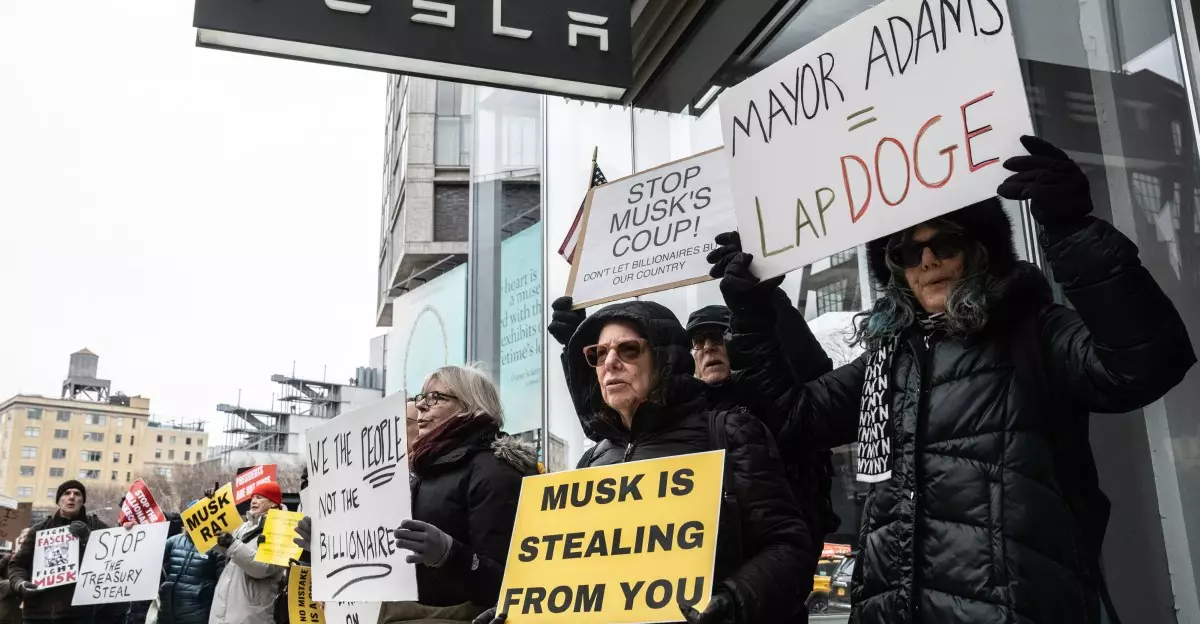Recent weekends have witnessed a notable resurgence in protests outside Tesla showrooms across the United States and even into Canada. The protests are ignited by a broad range of concerns, particularly focused on the controversial leadership of Tesla’s CEO, Elon Musk. As dissent influences public perception and investor confidence, the conversation surrounding Tesla is becoming increasingly charged. From bustling urban centers like New York City to quieter locales such as Golden Valley, Minnesota, the protests appear to be both widespread and emotionally charged.
The protests have been fueled by the #TeslaTakeover movement trending on social media platforms, particularly on Bluesky, a Twitter alternative. Though not massive in scale, the protests are notable for their frequency and diversity. The main target of the demonstrations is Musk’s involvement with far-right political movements and his role in the Department of Government Efficiency since the beginning of Donald Trump’s presidency. Critics assert that Musk’s political endeavors have seeped into Tesla’s corporate ethos, fostering an atmosphere of dissent among employees and investors alike. The resonance of the #TeslaTakeover hashtag reflects a collective frustration that rallies individuals from differing backgrounds and beliefs into a singular purpose.
The implications of Musk’s political activities have started to manifest in Tesla’s stock performance, which has suffered a staggering 21 percent decline since Trump’s inauguration. Investors are beginning to express legitimate concerns over how Musk’s actions may affect company stability and growth. Internal meetings have reportedly revealed that some senior staff believe Tesla would fare better if Musk were to step down. Through these revelations, a disconnect emerges between Musk’s public persona and the internal climate within one of the world’s most innovative companies.
At the forefront of the protests, participants are vocal about their disdain for Musk’s views and actions. Voice their frustrations through vivid slogans, such as “Don’t buy swasticars,” they methodically tie Musk’s political affiliations to their consumer choices. Some protests even feature high-profile supporters such as actor Alex Winter, who has become increasingly vocal against Tesla and Musk through social media platforms, urging Tesla owners to reconsider their purchases. The protests span cities, with notable gatherings in Austin, Seattle, and Boston, underscoring that this movement is not localized but rather a nationwide outcry.
The celebrity involvement adds an interesting dynamic to these protests. Musicians and activists alike have utilized their platforms to further raise awareness about the societal implications of supporting a brand synonymous with Musk. Sheryl Crow’s recent video depicting a Tesla being removed by a flatbed truck stands out as an emblematic repudiation of the brand, branding it as a choice aligned with far-right extremism. Such actions highlight a growing consciousness among consumers regarding the brands they support and their alignment with personal values.
With Martin Luther King Jr. Day looming, more protests are scheduled, indicating that this movement is not showing signs of abating. Locations like Lowell, Maine, and Richmond, Virginia, are expected to host rallies as demonstrators continue to pressure Tesla and advocate for broader accountability across industries connected to controversial figures. As frustration levels mount, the question remains: will Tesla and Musk address these rising concerns, or will dissent simply shape the evolving narrative of the electric vehicle titan?
The protests against Tesla and Elon Musk encapsulate a deeper wave of societal shifts where corporate ethics and political affiliations are increasingly under scrutiny. Demonstrators are uniting their voices against a backdrop of economic concern and ethical consideration, signaling a desire for corporate entities to align more closely with the values of their consumer base. The ongoing protests reflect not only discontent with one company but signify a broader cultural reckoning that could reshape consumer behavior and corporate governance in the years to come.


Leave a Reply